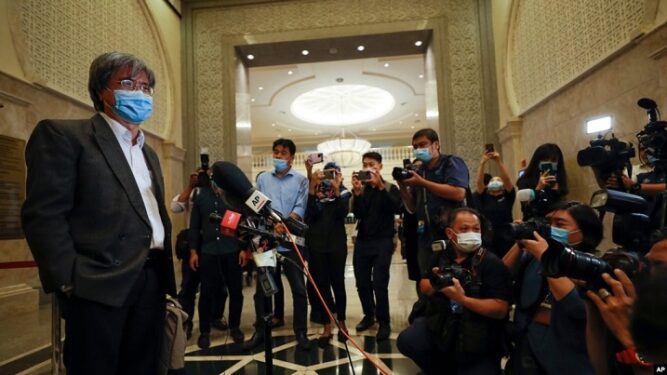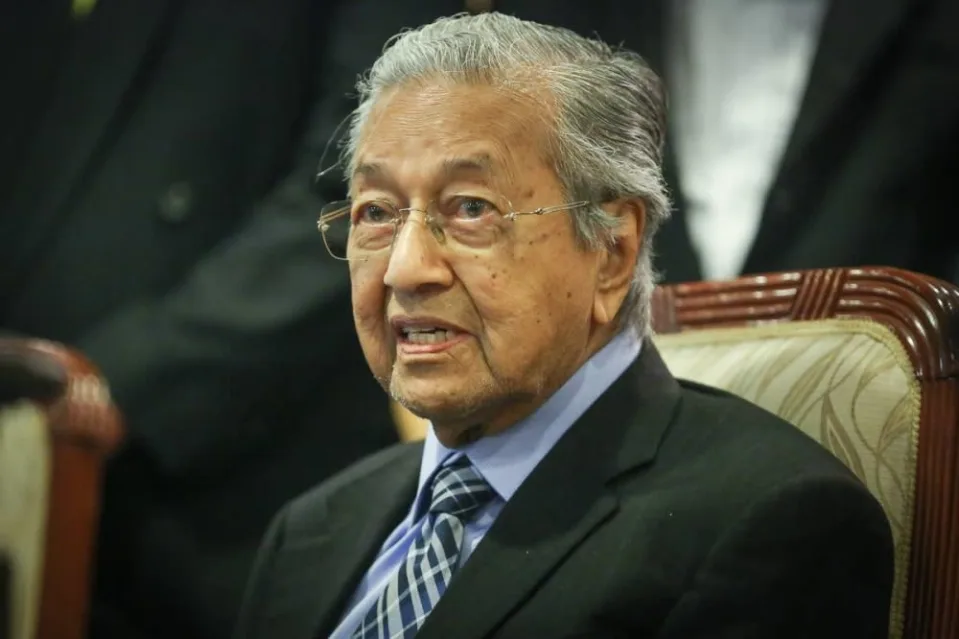FORMER prime minister Dr Mahathir Mohamad has expressed his concern over the recent criminal defamation charges initiated against The Edge’s editor emeritus Azam Aris over two articles published by the publication relating to the manipulation of penny stocks in the past.
The Pejuang chairman said if there is no truth to what was reported, the person or companies who felt that they were wronged should have sued the editor and the publication for defamation.
“That is what, in most other cases, we have witnessed in disputes involving media reports,” Mahathir said in a statement today.
However, the Langkawi MP noted that in this case, The Edge reported about a crime taking place, and “by any logic”, investigations should have been directed at the people alleged to have committed the crime.
As such, Mahathir said the readiness of the public prosecutor’s office to initiate criminal charges against the editor over this was “quite baffling”, adding that the people accused should have taken civil action against the publication instead.
“Having editors charged and handcuffed as common criminals is intimidating and sets back efforts to promote the freedom of the press, which the Pakatan Harapan Government had committed itself to during the 22-month of its rule,” he added.
“Such action only serves to further erode our freedom of the press ratings, which had taken a major dip in the past two years.”
Malaysia dropped 18 ranks from 101st place in 2020 to 119th place in 2021 out of 180 countries in Reporters Without Borders’ annual World Press Freedom Index, on the back of worsening restrictions on journalists exacerbated by COVID-19.

While Malaysia ranked higher at 113th place in this year’s index, the country’s press freedom score decreased from 60.53 in 2020 to 51.55.
What makes it worse, Mahathir added, is that the handcuffing of an editor sends a “very wrong signal” with regards to the country’s justice system and rule of law when other high-profile criminals who have even been convicted can “strut around freely, without handcuffs and even allowed to attend parliamentary sessions”.
Obvious jibe
This was an obvious jibe at Mahathir’s long-time political rival and fellow former prime minister Datuk Seri Najib Razak, who is currently serving time in Kajang Prison after the Federal Court in August upheld his SRC International conviction, sentence and fine.
It was reported this week that Najib is seeking a court order to be allowed to attend Parliament after the Prisons Department rejected his proposal. His lawyer has also appealed to the court to allow the Pekan MP to visit his constituents in Pahang.
“Though the two cases are different, the principle of justice and fairness should apply equally,” Mahathir said.
“To my mind, the Attorney-General’s Chambers (AGC) can still redeem itself and remedy the situation,” he added. “Withdraw the case and let the two parties settle their dispute through civil action.”
Mahathir’s comments on press freedom can be considered ironic as it was he who instigated “more autocratic and increasing control” of the media during his first stint as prime minister in the 1990s, as noted by University Utara Malaysia (UUM) Assoc Prof Azizuddin Mohd Sani Mohd.
In a research paper published in 2018, Azizuddin said Mahathir “implied” that racial conflict and political instability were “inevitable” in a multiracial society unless protected by laws like the defunct-act Internal Security Act (ISA) 1960, the Printing Presses and Publications Act (PPPA) 1984 and the Sedition Act 1948.
The amendment of these laws by Mahathir was also presented as a “preventative action” following the Ops Lalang, a major crackdown between Oct 27 and Nov 20 in 1987 ostensibly to prevent the occurrence of racial riots in Malaysia.
Three major newspapers – The Star, Sin Chew Jit Poh and Malay weekly Watan – had their licenses revoked during this time, and by the end of the 1980s, Mahathir had a “firm hold on all power” and strongly applied the “refeudalisation process”, according to Azizuddin.
“The consequences of (this) media policy in Malaysia under Mahathir’s leadership… was that many local newspapers, especially daily newspapers, were either controlled or owned by Barisan Nasional (BN) in order to dominate the public sphere of the media,” Azizuddin wrote in his paper, Media Freedom and Legislation in Malaysia.
“The result is that freedom of the press and an open public sphere are almost non-existent in Malaysia, where the Government has a full power to control the media and restrict the alternative or opposition media.” – Oct 6, 2022
Main photo credit: Malay Mail









